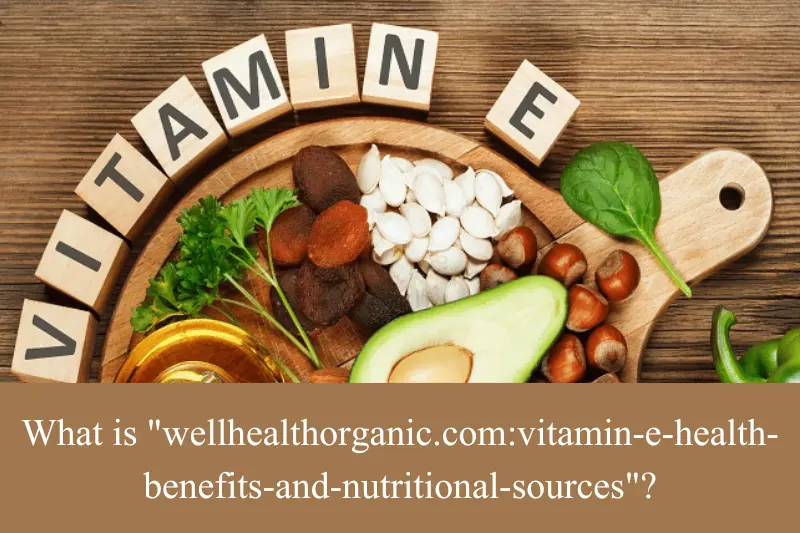Vitamin E is a powerful antioxidant that plays a crucial role in maintaining overall health and well-being. From supporting immune function to promoting skin health, this essential nutrient offers a wide range of benefits for the body. At Wellhealthorganic.Com, we delve into the numerous health benefits of vitamin E and explore its nutritional sources to help you incorporate this vital nutrient into your diet.
Understanding Vitamin E
What is Vitamin E?
Vitamin E is a group of fat-soluble compounds known for their antioxidant properties. The most active form of vitamin E in the body is alpha-tocopherol, although other forms such as beta-tocopherol, gamma-tocopherol, and delta-tocopherol also contribute to its overall benefits. As an antioxidant, vitamin E helps neutralize free radicals, which are unstable molecules that can damage cells and contribute to aging and chronic disease.
Health Benefits of Vitamin E
1. Powerful Antioxidant Protection
Vitamin E scavenges free radicals, protecting cells from oxidative damage and reducing the risk of chronic diseases such as heart disease, cancer, and neurodegenerative disorders.
2. Supports Immune Function
Vitamin E plays a vital role in immune function by enhancing the activity of immune cells and promoting the production of antibodies, which help the body fight off infections and diseases.
3. Promotes Skin Health
Vitamin E is known for its skin-nourishing properties. It helps moisturize the skin, reduces inflammation, and protects against UV damage, helping to maintain a youthful complexion and prevent premature aging.
4. Supports Eye Health
Vitamin E, particularly when combined with other antioxidants like vitamin C and zinc, may help reduce the risk of age-related macular degeneration (AMD) and cataracts by protecting the eyes from oxidative stress.
5. Cardiovascular Protection
Vitamin E helps maintain heart health by preventing the oxidation of LDL cholesterol, reducing inflammation, and improving blood vessel function, thereby lowering the risk of heart disease and stroke.
Nutritional Sources of Vitamin E
1. Nuts and Seeds
- Almonds: Almonds are one of the best sources of vitamin E, with just a handful providing a significant portion of the recommended daily intake.
- Sunflower Seeds: Sunflower seeds are rich in vitamin E and other nutrients, making them a nutritious snack or addition to salads and baked goods.
- Hazelnuts: Hazelnuts are packed with vitamin E and offer a deliciously nutty flavor that pairs well with both sweet and savory dishes.
2. Vegetable Oils
- Sunflower Oil: Sunflower oil is a popular cooking oil that contains high levels of vitamin E, making it a valuable addition to your kitchen pantry.
- Safflower Oil: Safflower oil is another vegetable oil rich in vitamin E, with a neutral flavor that makes it suitable for a variety of culinary applications.
- Wheat Germ Oil: Wheat germ oil is one of the most concentrated sources of vitamin E, making it a potent supplement for boosting your intake of this essential nutrient.
3. Green Leafy Vegetables
- Spinach: Spinach is a nutritional powerhouse that contains vitamin E along with other essential vitamins and minerals. Incorporate spinach into salads, smoothies, or cooked dishes for a nutrient boost.
- Kale: Kale is another leafy green vegetable that’s rich in vitamin E and other antioxidants, making it a valuable addition to any healthy diet.
- Swiss Chard: Swiss chard is a versatile leafy green that can be enjoyed raw in salads or cooked in soups, stir-fries, and other dishes to reap its nutritional benefits.
4. Fortified Foods
- Fortified Breakfast Cereals: Many breakfast cereals are fortified with vitamin E, providing a convenient way to boost your intake of this essential nutrient.
- Fortified Plant-Based Milk: Some plant-based milk alternatives, such as almond milk or soy milk, are fortified with vitamin E, making them suitable options for individuals following a vegan or dairy-free diet.
5. Supplements
While it’s best to obtain vitamin E from dietary sources, supplements can be useful for individuals who have difficulty meeting their needs through food alone. Vitamin E supplements are available in various forms, including capsules, softgels, and liquid drops, and should be taken as directed by a healthcare professional.
Incorporating Vitamin E into Your Diet
1. Snack on Nuts and Seeds:
- Enjoy a handful of almonds, sunflower seeds, or hazelnuts as a nutritious snack between meals to boost your vitamin E intake.
2. Cook with Vegetable Oils:
- Use sunflower oil, safflower oil, or wheat germ oil for cooking and salad dressings to add flavor and increase your vitamin E consumption.
3. Load Up on Leafy Greens:
- Include spinach, kale, and Swiss chard in your meals to increase your intake of vitamin E, fiber, and other essential nutrients.
4. Choose Fortified Foods:
- Opt for fortified breakfast cereals and culinary uses.
- Olive Oil: Olive oil is renowned for its health benefits, including its high vitamin E content, which contributes to its antioxidant properties.
3. Leafy Greens
- Spinach: Spinach is a nutrient-dense leafy green vegetable that provides an abundance of vitamins and minerals, including vitamin E.
- Swiss Chard: Swiss chard is another leafy green packed with vitamin E and other antioxidants, making it a nutritious addition to salads, stir-fries, and smoothies.
- Kale: Kale is rich in vitamin E and other essential nutrients, making it a powerhouse ingredient for boosting overall health and well-being.
4. Fortified Foods
- Fortified Cereals: Many breakfast cereals are fortified with vitamins and minerals, including vitamin E, to enhance their nutritional value.
- Fortified Plant-Based Milk: Plant-based milk alternatives, such as almond milk, soy milk, and coconut milk, are often fortified with vitamin E to provide additional nutrients.
- Fortified Snack Bars: Some snack bars and energy bars are fortified with vitamin E and other nutrients to offer a convenient and nutritious on-the-go option.
Incorporating Vitamin E into Your Diet
To reap the health benefits of vitamin E, aim to incorporate a variety of vitamin E-rich foods into your daily diet. Consider adding nuts and seeds to your morning oatmeal or yogurt, drizzling salads with olive oil or sunflower oil, and incorporating leafy greens into soups, stews, and smoothies. Additionally, choose fortified foods like cereals, milk alternatives, and snack bars to boost your vitamin E intake.
What is “wellhealthorganic.com:vitamin-e-health-benefits-and-nutritional-sources”?

“wellhealthorganic.com:vitamin-e-health-benefits-and-nutritional-sources” refers to a comprehensive guide that explores the various health benefits and nutritional sources of Vitamin E.
Essentially, it’s a resource that provides valuable information about how Vitamin E can positively impact your health and where you can find it in your diet.
Whether you’re curious about the benefits of Vitamin E or interested in incorporating it into your daily nutrition, this guide is here to help you understand all there is to know about this essential nutrient.
Why is “wellhealthorganic.com:vitamin-e-health-benefits-and-nutritional-sources” Important?
Essential Antioxidant Protection:
- Vitamin E is a potent antioxidant that helps protect your cells from damage caused by free radicals, thereby reducing the risk of chronic diseases like cancer and heart disease.
Skin Health and Beauty:
- Vitamin E plays a crucial role in maintaining healthy skin by promoting cell regeneration, moisturization, and protection against UV damage, resulting in youthful and radiant skin.
Immune System Support:
- By bolstering the immune system, Vitamin E helps your body defend against infections and illnesses, keeping you healthy and resilient year-round.
Heart Health Maintenance:
- Vitamin E contributes to heart health by preventing the oxidation of LDL cholesterol, reducing the risk of plaque buildup in arteries and lowering the chances of cardiovascular diseases.
Eye Health Enhancement:
- Studies suggest that Vitamin E may help prevent age-related macular degeneration and cataracts, promoting better vision and eye health as you age.
Brain Function Improvement:
- Vitamin E has been linked to improved cognitive function and reduced risk of cognitive decline in older adults, potentially delaying the onset of conditions like Alzheimer’s disease.
Reproductive Health Support:
- For both men and women, Vitamin E plays a role in fertility and reproductive health by protecting reproductive cells from oxidative damage and supporting hormone balance.
Muscle Recovery and Repair:
- Athletes and active individuals can benefit from Vitamin E’s ability to reduce exercise-induced oxidative stress, aiding in muscle recovery and repair after strenuous workouts.
Hair Growth and Strength:
- Vitamin E promotes healthy hair growth and strength by improving blood circulation to the scalp, nourishing hair follicles, and preventing oxidative stress that can lead to hair loss.
Essential Properties of Vitamin E
- Antioxidant: Neutralizes free radicals, preventing cell damage and oxidative stress.
- Strengthens the immune system: Contributes to the normal function of immune cells and protects against infections.
- Protects cardiovascular health: Reduces the risk of heart disease by decreasing the oxidation of LDL (“bad”) cholesterol.
- Maintains skin health: Promotes skin elasticity and hydration, delaying the appearance of wrinkles and signs of aging.
- Enhances eye health: Prevents age-related macular degeneration and cataracts.
- Cognitive function: Protects brain cells from oxidative damage and may help prevent neurodegenerative diseases like Alzheimer’s.
Subsection: The Different Forms of Vitamin E
There are several forms of vitamin E, with alpha-tocopherol being the most common and biologically active form in the human body. Other forms include beta-tocopherol, gamma-tocopherol, and delta-tocopherol, each with its unique properties and benefits. Understanding the different forms of vitamin E can help individuals make informed choices when it comes to supplementation or dietary intake.

Exploring the Various Health Benefits of Vitamin E
Vitamin E is a powerful antioxidant that plays a crucial role in maintaining good health. It helps protect cells from damage caused by free radicals, which can lead to chronic diseases such as heart disease and cancer. Additionally, vitamin E is known for its anti-inflammatory properties, which can help reduce the risk of conditions like arthritis and asthma. Furthermore, vitamin E has been linked to improved eye health, as it helps protect the cells in the eyes from oxidative stress.
Research has also shown that vitamin E may have benefits for brain health, as it can help prevent cognitive decline associated with aging. Some studies suggest that vitamin E may even aid in the prevention of conditions like Alzheimer’s disease. Moreover, vitamin E is essential for maintaining healthy skin and hair, as it helps protect against UV damage and promotes skin repair. With all these health benefits, it is clear that incorporating sufficient vitamin E into your diet is crucial for overall well-being.
Top Nutritional Sources of Vitamin E for a Balanced Diet
Vitamin E is a powerful antioxidant that plays a crucial role in maintaining good health. Including vitamin E-rich foods in your diet is essential for proper cell function and overall well-being. Some of the top nutritional sources of vitamin E include nuts, seeds, and green leafy vegetables.
Nuts and seeds like almonds, sunflower seeds, and hazelnuts are excellent sources of vitamin E. Incorporating these into your daily meals or snacks can help ensure you are meeting your daily vitamin E requirements. Additionally, green leafy vegetables such as spinach, kale, and broccoli are also rich in vitamin E and provide a host of other essential nutrients for optimal health.
Understanding the Role of Vitamin E in Boosting Immune System Function
Vitamin E plays a crucial role in supporting our immune system’s function. It is a powerful antioxidant that helps protect our cells from damage caused by free radicals, thereby enhancing our body’s defense mechanisms against infections and diseases. By neutralizing free radicals, vitamin E helps reduce inflammation and promotes the proper functioning of immune cells, such as T cells and B cells, which are essential for identifying and destroying harmful pathogens.
Furthermore, vitamin E has been shown to regulate the immune response by modulating cytokine production and signaling pathways. This can help the immune system differentiate between foreign invaders and healthy cells, preventing autoimmune reactions. Adequate levels of vitamin E in the body are essential for maintaining a robust immune system and overall wellbeing. To ensure optimal immune function, it is important to include vitamin E-rich foods in your daily diet or consider supplementation under the guidance of a healthcare provider.
How Vitamin E Supports Skin Health and Anti-Aging Properties
Benefits of Vitamin E for Skin Health
Vitamin E is a powerful antioxidant that plays a crucial role in maintaining healthy skin. It helps protect the skin from damage caused by free radicals, environmental factors, and UV rays. Vitamin E also supports the skin’s natural healing process, making it effective in treating scars, burns, and skin conditions such as eczema and psoriasis.
Anti-Aging Properties of Vitamin E
Regular consumption of vitamin E can help slow down the aging process and reduce the appearance of wrinkles and fine lines. By neutralizing free radicals, vitamin E helps prevent oxidative stress, which is a major contributor to premature aging. Additionally, vitamin E promotes collagen production, improving skin elasticity and firmness for a more youthful appearance.
Incorporating Vitamin E into Your Daily Wellness Routine
Section 6 focuses on the practical aspects of integrating Vitamin E into your daily routine to promote overall wellbeing. By incorporating this essential nutrient into your daily regimen, you can experience a multitude of health benefits, from supporting immune system function to promoting skin health and anti-aging properties. Including a variety of Vitamin E-rich foods in your diet, such as nuts, seeds, and leafy greens, can help ensure you are meeting your daily recommended intake.
Conclusion
Vitamin E plays a vital role in maintaining overall health and well-being, from supporting immune function to promoting skin health and cardiovascular protection. By incorporating vitamin E-rich foods into your diet, such as nuts, seeds, vegetable oils, leafy greens, and fortified foods, you can ensure you’re getting an adequate intake of this essential nutrient. At Wellhealthorganic.Com, we encourage you to prioritize vitamin E-rich foods as part of a balanced diet to support your health and vitality for years to come.
